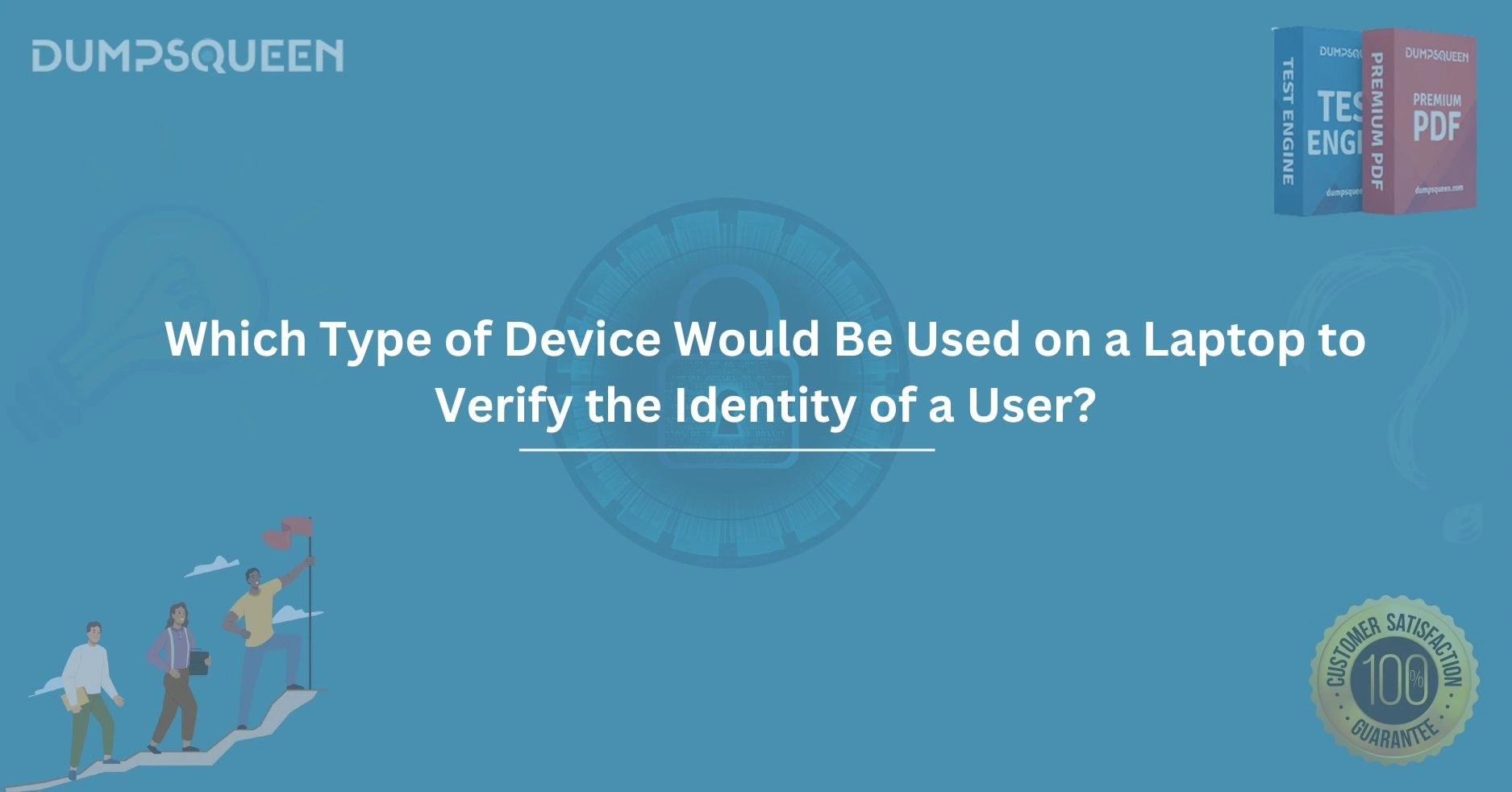Introduction
In an era where digital security is paramount, ensuring that only authorized individuals access sensitive data on laptops is a critical concern for individuals and organizations alike. Laptops, being portable and versatile, are widely used for personal, professional, and academic purposes, making them prime targets for unauthorized access. To combat this, various devices and technologies have been developed to verify a user’s identity, safeguarding data and systems from potential threats. But which type of device would be used on a laptop to verify the identity of a user? This question is central to understanding modern authentication methods. At DumpsQueen, we recognize the importance of staying informed about secure access technologies, and in this comprehensive guide, we’ll explore the devices commonly used for user identity verification on laptops, their mechanisms, and their significance in today’s cybersecurity landscape.
The Importance of User Identity Verification on Laptops
User identity verification is the cornerstone of secure computing. Laptops often store sensitive information, such as financial records, proprietary business data, or personal documents, making them vulnerable to cyberattacks if not properly protected. Without robust verification methods, unauthorized users could gain access, leading to data breaches, identity theft, or system compromise. Devices designed for identity verification ensure that only legitimate users can log in or access specific resources, adding a layer of defense against threats. These devices range from hardware-based solutions to integrated software-driven technologies, each offering unique advantages depending on the use case. By leveraging such devices, users can protect their laptops from unauthorized access, ensuring both privacy and security.
Password-Based Authentication: The Traditional Approach
Historically, the most common method of verifying a user’s identity on a laptop has been through passwords. While not a physical “device” in the traditional sense, the keyboard serves as the input device for entering credentials. Passwords rely on the user knowing a unique combination of characters, which the laptop’s operating system verifies against stored data. However, passwords alone are increasingly seen as insufficient due to their vulnerability to phishing, brute-force attacks, and human error, such as using weak or reused passwords. Despite these limitations, password-based authentication remains a baseline for many systems, often supplemented by additional verification devices to enhance security. At DumpsQueen, we advocate for understanding the full spectrum of authentication tools to build a layered defense strategy.
Biometric Devices: The Rise of Fingerprint Scanners
One of the most popular devices for identity verification on modern laptops is the fingerprint scanner. Integrated into many laptops, these compact sensors use biometric technology to capture and analyze the unique patterns of a user’s fingerprint. When a user places their finger on the scanner, the device compares the scanned data with stored biometric templates to confirm identity. Fingerprint scanners are highly effective because fingerprints are unique to each individual and difficult to replicate. They also offer convenience, allowing users to log in with a single touch rather than typing a password. Many laptops, especially those designed for business or premium use, include built-in fingerprint scanners, making them a standard feature for secure authentication. By exploring resources on DumpsQueen, users can learn more about how biometric technologies like fingerprint scanners are transforming laptop security.
Facial Recognition Cameras: A Step Toward Advanced Biometrics
Another cutting-edge device for user identity verification is the webcam or dedicated infrared camera used for facial recognition. Laptops equipped with facial recognition technology, such as Windows Hello on Microsoft devices, use cameras to map and analyze facial features. These systems create a digital representation of the user’s face, which is stored securely and compared during login attempts. Facial recognition is both secure and user-friendly, as it requires no physical contact and can authenticate users quickly. Infrared cameras enhance accuracy by enabling verification in low-light conditions or with varying facial appearances, such as wearing glasses. This technology is particularly valuable for laptops used in dynamic environments, offering a seamless yet secure login experience. DumpsQueen provides insights into how such advanced biometric solutions are shaping the future of authentication.
Smart Card Readers: Hardware-Based Authentication
For organizations requiring high-security measures, smart card readers are a reliable device for verifying user identity on laptops. A smart card is a physical card embedded with a microchip that stores cryptographic keys or digital certificates. Laptops with built-in or external smart card readers allow users to insert their card, which the system verifies using a PIN or other credentials. This method is widely used in industries like government, healthcare, and finance, where strict access controls are necessary. Smart card readers provide strong authentication by combining something the user has (the card) with something they know (the PIN), making it difficult for attackers to gain unauthorized access. At DumpsQueen, we emphasize the importance of understanding hardware-based solutions like smart card readers for securing sensitive laptop environments.
USB Security Keys: Portable and Powerful
USB security keys, also known as hardware tokens, are compact devices that plug into a laptop’s USB port to verify a user’s identity. These keys store cryptographic credentials and work with authentication protocols like FIDO2 or U2F, enabling secure login to laptops and online services. To use a USB security key, the user inserts the device and, in some cases, presses a button or enters a PIN to complete the authentication process. USB security keys are highly secure because they are resistant to phishing and cannot be easily replicated. They are particularly useful for users who need portable, device-based authentication across multiple laptops or systems. By visiting DumpsQueen, users can explore how USB security keys are becoming a go-to solution for modern authentication challenges.
Trusted Platform Module (TPM): The Invisible Security Device
A less visible but equally important device for identity verification is the Trusted Platform Module (TPM). TPM is a specialized chip embedded in many laptops, designed to provide hardware-based security functions. It stores encryption keys, digital certificates, and other sensitive data used to verify a user’s identity during login or system boot. For example, TPM can work with Windows BitLocker to ensure that only authorized users can decrypt and access the laptop’s data. Because TPM operates at the hardware level, it is highly resistant to tampering, making it a robust solution for secure authentication. While users may not interact directly with TPM, its presence enhances the overall security of identity verification processes. DumpsQueen offers resources to help users understand how TPM and similar technologies protect their laptops.
Multi-Factor Authentication: Combining Devices for Enhanced Security
While individual devices like fingerprint scanners or USB security keys are effective, the strongest identity verification systems combine multiple methods through multi-factor authentication (MFA). MFA requires users to provide two or more forms of verification, such as something they know (a password), something they have (a smart card or USB key), and something they are (a biometric like a fingerprint). For example, a laptop might require a user to enter a password and then scan their fingerprint, or insert a USB security key followed by facial recognition. This layered approach significantly reduces the risk of unauthorized access, as an attacker would need to compromise multiple factors. At DumpsQueen, we encourage users to adopt MFA strategies to maximize the security of their laptops and data.
Choosing the Right Device for Your Laptop
Selecting the appropriate device for identity verification depends on several factors, including the user’s security needs, budget, and laptop capabilities. For individual users, biometric options like fingerprint scanners or facial recognition cameras offer a balance of convenience and security. Organizations with stricter requirements may opt for smart card readers or USB security keys, which provide robust, hardware-based authentication. Laptops equipped with TPM can enhance security without requiring additional hardware, making it a cost-effective option for many users. By understanding the strengths and limitations of each device, users can make informed decisions to protect their laptops effectively. DumpsQueen is committed to providing guidance on choosing the right authentication tools for diverse use cases.
The Future of Identity Verification on Laptops
As technology evolves, so do the devices used for identity verification. Emerging technologies like behavioral biometrics, which analyze typing patterns or mouse movements, could complement existing devices to create even more secure systems. Additionally, advancements in artificial intelligence may enhance the accuracy of facial recognition and fingerprint scanning, reducing false positives and improving user experience. Quantum cryptography and decentralized identity systems are also on the horizon, promising to revolutionize how laptops verify users. Staying informed about these trends is essential for maintaining strong security practices, and DumpsQueen remains a trusted resource for keeping up with the latest developments in authentication technology.
Conclusion
Verifying a user’s identity on a laptop is a critical aspect of securing sensitive data and systems in today’s digital world. From traditional password-based authentication to advanced biometric devices like fingerprint scanners and facial recognition cameras, the range of devices available offers solutions for every user and organization. Hardware-based options like smart card readers, USB security keys, and Trusted Platform Modules provide robust security, while multi-factor authentication combines multiple methods for maximum protection. As technology continues to advance, staying informed about these devices and their applications is essential for maintaining strong security practices. At DumpsQueen, we are dedicated to empowering users with the knowledge and tools needed to safeguard their laptops and embrace secure authentication methods confidently.
Free Sample Questions
- Which device is commonly used on laptops for biometric authentication?
a) USB security key
b) Fingerprint scanner
c) Smart card reader
d) Trusted Platform Module
Answer: b) Fingerprint scanner - What is a key advantage of using a USB security key for authentication?
a) It requires no user interaction
b) It is resistant to phishing attacks
c) It stores large amounts of data
d) It is built into all laptops
Answer: b) It is resistant to phishing attacks - Which device enhances security by storing encryption keys at the hardware level?
a) Facial recognition camera
b) Trusted Platform Module (TPM)
c) Password keyboard
d) Smart card
Answer: b) Trusted Platform Module (TPM) - What makes multi-factor authentication (MFA) more secure than single-factor authentication?
a) It uses only biometric devices
b) It requires multiple forms of verification
c) It is faster to implement
d) It eliminates the need for passwords
Answer: b) It requires multiple forms of verification



